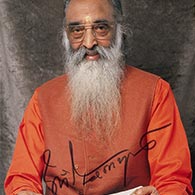Dear Hindus,
Hari om. Gurupurnima Pranams and Greetings!
It is not by our karma, but by the Kripa of Ishwara and Karuna of the Lord that we get a Param Guru. We are blessed to be under the parampara of such ParamGurus like Swami Sivanandaji Maharaj, Swami Tapovan Maharaj, Poojya Gurudev Swami Chinmayanandaji. We are steeped in ignorance and unaware of what binds us and our own suffering. These Great Masters have dedicated their lives to awaken us, encourage us to be seekers and break-free from our delusions. May we intensify our seeking and be worthy instruments of their Kripa and Karuna. May the Grace of the Guru-Parampara lead us to the Guru-Tattva - The Self in us.
Here is the 2nd Hindu Culture Capsule - an offering at the Lotus feet of our Guruparampara:
In this capsule Read about the Story of Sri Veda Vyasa’s birth and its significance, listen to the story narrated by Poojya Gurudev Swami Chinmayanandaji, learn about 18 amazing facts of Sri Veda Vyasa’s life and also know what to do on Gurupurnima. Take a simple quiz on the Guruparampara at QUIZ
A video message about the beauty of our culture and how it has survived inspite of so many challenges and attacks:
Om Shri Gurubhyo Namaha.
Love & Om,
Swami Swatmananda
Ashadhi Purnima is celebrated by all seekers of knowledge as Guru Purnima. It’s the sacred day for all disciples to express their gratitude to the Guru Parampara. It’s the Hindu way of celebrating Teachers’ Day. It’s the day Sri Vedavyasa manifested. Lets learn more about this great Master.
Sri Veda-Vyasa – 18 Facts
- Genealogy: Descended from Visnu in the following order: Brahma-Vasistha-Sakti-Parasara-Vyasa.
- Vyasa was born to hermit Parasara by a fisher-woman named Kali(also known as Satyavati or Matsyagandha). Story and the symbolism is given below.
- His name when he was a child was Krsna because he was dark in complexion.
- As his birth took place in an island(Dvipa) he got the name Krsnadvaipayana.
- Most of the scholars are of opinion that the period of Vyasa was between 1800 and 1500 B.C.
- The Vedic knowledge was handed down in oral tradition from the Guru to the Shishya. Vyasa detected a growing danger and a threat to this tradition as the human minds became grosser and the memory became weaker.
- Poojya Gurudev Swami Chinmayananda said - “Hinduism was then facing the danger of total annihilation. The Scriptures were fast fading away even among those who were supposed to be the custodians of the sacred lore. The mantras if the Vedas were being slowly forgotten by the people; in that general forgetfulness of the generation the entire subjective science of the Vedas would have been lost – had it not been for the great revolutionary reformer, the poet philosopher known as Vyasa. Until his time, every new edition of the Vedas had been composed in the mouth of the Guru and directly on the memory slabs of his pupils’ hearts. As Vyasa moved around the country, he soon realized the various versions of the same Vedas, such as the Benares version and the Deccan version, had slowly infiltrated the original texts. He, therefore, collected all the vedic passages and for the first time edited them into written volumes which constitute the four great Vedas as they are known today. In compiling the vedic mantras, Vyasa edited them into four books, the Rig-Veda, the Yajur-Veda, the Sama-Veda and the Atharva-Veda. However, the systematic thinker in Vyasa was not satisfied with merely classifying the entire wealth of Vedic knowledge into four volumes; in each volume he also brought about a harmonious rhythm, both in arrangement and the classification of the contents. He divided each book roughly into 4 sections; Mantras(chants or hymns), Brahmanas(rituals and rules of conduct), Aranyakas(methods of subjective worship) and the Upanishad(philosophical revelations). The Upanishads are thus found in the last section of each Veda, and therefore the philosophy of the Upanishads has come to be called Vedanta, “the end of the Veda”.”
- After compiling and classifying the Vedas he got the name Vedavyasa.
- He is a prolific author who wrote the 18 Puranas, 18 Upa-Puranas, Mahabharata(the world’s largest poem) & Brahmasutras/Vedanta Sutras. In this way, he established the three paths, viz., Karma, Upasana and Jnana.
- Some scholars believe that Badarayana who wrote the Brahmasutras is different from Vedavyasa. Others believe they are one.
- Vyasa means compiler, to split, differentiate, or describe; it also means editor. He compiled and classified the Vedas. The word Vyasa means he who describes elaborately. "He became Vyasa because he had described all the Vedas".( Mahabharata Adi Parva,Chapter 63,Stanza 88). Vyas=describe (Differentiate the branches and divide).
- Vyasa also means diameter. Diameter is the longest chord in the circle(Perfection). Vyasa as though measured Perfection.
- We do not see Krsnadvaipayana, who had grown up to a youth at the time of his birth, for many years after his departure, bidding adieu to his mother, He might have been living with hermits in the forests, learning Vedas from them. After this he appears on the banks of river Sarasvati as a teacher and author. He wrote the Mahabharata on the banks of Sarasvati river at ManaVillage. Even today you can visit the cave when you go to Badrinath.
- The cave of Sri Veda vyasa is on top and Ganesh-Gufa is at the bottom. Sri Vedavyasa and Ganesha were not sitting close to each other and Vedavyasa was not dictating to Lord Ganesha. It was through though-transference that the knowledge was passed on.
- Disciples: Suka commenced advanced study under his father Vyasa. He also learnt the Bhagavatam from his father. Besides Suka, Vyasa had disciples such as Vaisampayana, Suta, Paila, Jaimini and others also, living with him. The hermitage of Vyasa was a great educational institution, with plenty of disciples. He taught the Vedas to them and gave them the responsibility to practice, protect and propagate this Divine Knowledge.
- In Mahabharata, the words Krsna, Krsnadvaipayana, Dvaipayana, Satyavatisuta, Satyavatyatmaja, Parasarya, Parasaratmaja, Badarayana, Vedavyasa etc. are used as synonyms of Vyasa.
- Upto the end of this cycle of creation, He would be alive and so He is a Chiranjeevi. He had met Sri Adi Shankaracharya and debated with him disguised as an old man, on Brahmasutras. Pleased with Sri Adi Shankaracharya, Bhagavan Veda Vyasa extended his life by 16 more years.
- Pinjalaa was the name of Vyasa’s wife. She was the daughter of Rishi Jabali who was the son of Satyakam Jabala.
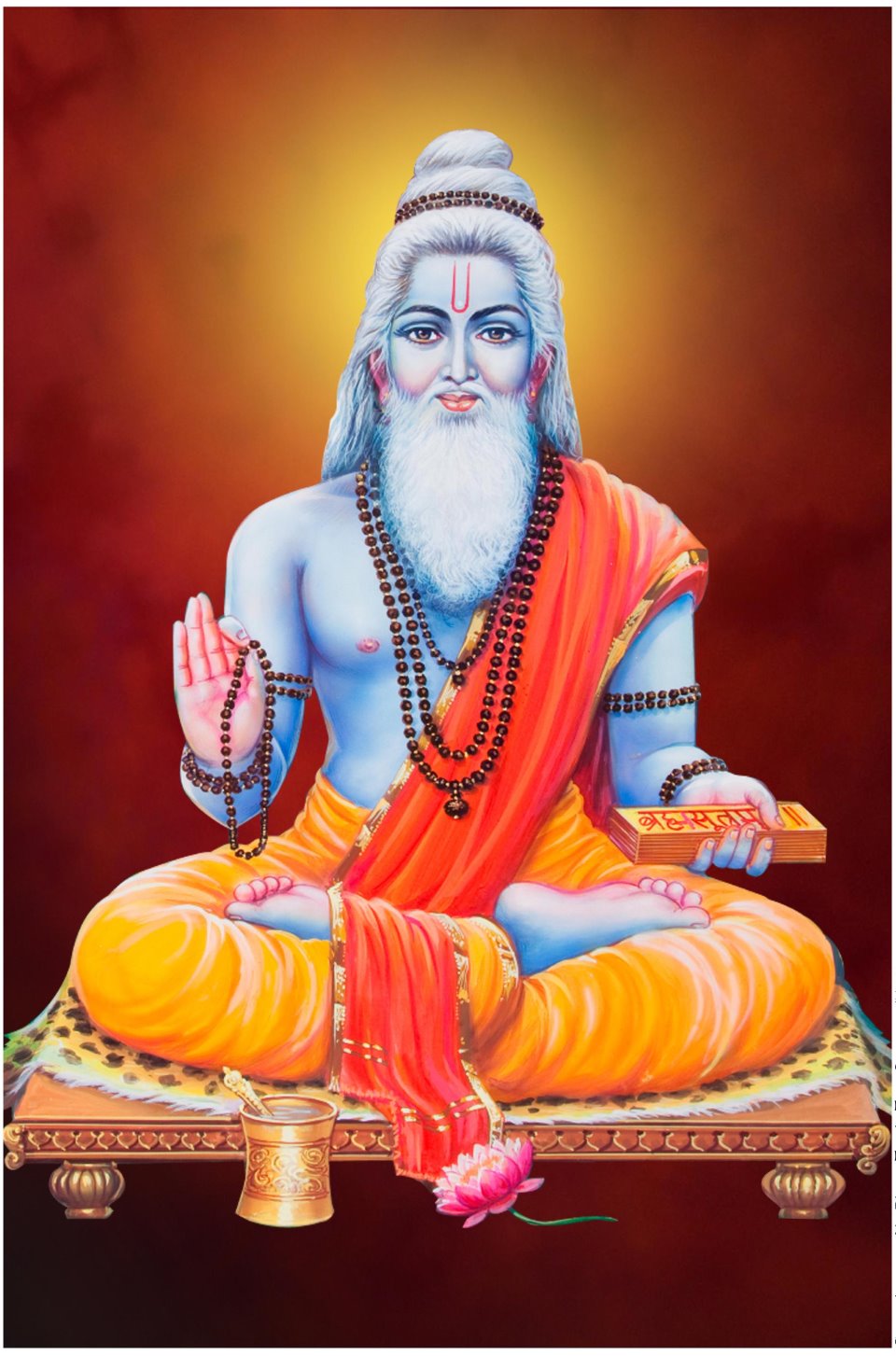
Sri Veda Vyasa’s Birth
Kali, a fisherwoman was the mother of Vyasa.There is a story about this Kali also.When king Vasu of Cedi went to the forest for hunting, he saw the coition of animals and he had seminal discharge.The king sent that semen to his queen. But on the way it fell in the river Kalindi and was eaten by a fish. This fish was a celestial maid named Adrika transformed to fish by a curse.The fish conceived and got into the net of a fisherman, who lived on the banks of Kalindi.When this fish was cut open a male and a female infant were seen inside.The male child was given to the king himself.The fisherman brought up the girl naming her Kali.As the girl had the gandha(smell)of matsya(fish),she got the name “Matsya-gandha' also. This fisherman was also a ferry-man. Kali used to help her father in ferrying people across the river Kalindi.She grew up and became a young woman. Once the hermit Parasara came by that way to go to the other side of the river. Parasara was a great Jnani and one of the supreme authorities on astrology and his book Parasara Hora is still a textbook on astrology. He has also written a Smriti known as Parasara Smriti which is held in such high esteem that it is quoted by our present-day writers on sociology and ethics. At that time, the fisherman who has been taking people across the river, was sitting on the bank of the river and having his meals.As soon as Parasara came, the innocent fisherman-the foster father of Matsyagandha-called her, who was standing close by and asked her to take the hermit across the river. The hermit got into the boat. Matsyagandha began to row the boat. Parasara came to know that a child, conceived at a particular Ghatika or moment of time, would be born as the greatest man of the age, nay, as an Avatar of Lord Vishnu Himself. He approached Satyavati and explained this to her. She consented. The hermit Parasara created an artificial fog around the boat. The smell of fish was gone from her and the fragrance of Musk took its place. The hermit created an artificial island in the middle of the river Yamuna. They got down on the island and acted a love drama. She became pregnant. Parasara said to her "Beautiful girl! Even after your confinement you shall remain a virgin. A son, who will be a portion of Visnu, a man of purity, famous throughout the three worlds, highly learned, the teacher-priest of the whole world, shall be born to you.He will divide the Vedas and will be exalted by the people of the world."
After this the great hermit took his bath in Yamuna and went away.The pregnancy of Kali was completed instantly and she gave birth to a very handsome boy in that island of Yamuna.As soon as he was born, he grew up and became a hermit radiant with devotion and assuming a vow of purity and abstinence he said to his mother."Mother!You can go anywhere, as you please. You need have no worry on my account.I am about to go for penance. When anything unpleasant happens to you, just think of me.The moment you wish to see me, I will be there by you.I wish you a happy life.I am going."Saying thus the brave boy walked away. (Devi Bhagavata,Skandha 2;Mahabharata,Adi Parva, Chapters 60 to 63)
Video of Swami Chinmayananda on Sri Vedavyasa’s Birth
Symbolism of the story of Sri Veda Vyasa’s Birth:
Swami Chinmayanandaji explains the symbolism beautifully thus: “The father, a brahmin, represents sattwa, the creative wisdom born out of a life of study and contemplation, while the fisherwoman represents a daring adventurousness with which she has to sail forth day by day in her frail craft into the deep sea, where she captures the unseen food and hauls it to the Shore, where dwellers can easily get their nourishment at their own door steps. Similarly, on the shore of Vedic knowledge, Vyasa sailed out to gather the best that it contained, and bring us the nutritive essence of Hinduism. In short, Vyasa was not merely a man of realization but was also one who had the spirit of adventure to serve his generation throughout his life. He was a revivalist who contributed the maximum to the Hindu Renaissance of that critical era. In fact, he was the most daring religious revolutionary that ever appeared on the horizon of Hindu cultural history.”
Many Vyasas or One Vyasa:
It is stated in the Puranas that in every Manu's age,a Vyasa will be born. It is mentioned in Visnu Purana,Arsa 3,Chapter 3, as to who were the persons who took birth as Vyasa in a particular Manu's age and which were the Vedas and branches of Vedas they had divided. It is given below:
During the age of Manu Vaivasvata, in each of the past Dvaparayugas, the Veda had been divided by great hermits, twenty-eight times.
Twentyeight Veda Vyasas have passed, each of whom had divided the Veda into four parts in each Dvapara Yuga.
- It was Brahma himself who had divided the Veda into four in the first Dvaparayuga.
- Prajapati was the Vedavyasa in the second Dvaparayuga.
- In the third,Vyasa was the teacher-priest Sukra
- In the fourth Brhaspati
- In the fifth the Sun
- In the sixth the all powerful Dharmaraja.
- It was Indra in the seventh
- Vasistha
- Sarasvata
- Tridhama
- Trisikha
- Bharadvaja
- Antariksa
- Varni
- Trayyaruna
- Dhananjaya
- Kratunjaya
- Jayain
- Bharadvaja
- Gautama
- It was hermit Haryatma who was the next Vyasa
- Then comes Vajasravas.
- The Next Vyasa was Trnabindu born in the clan of Somasusma.
- He was followed by Rksa. otherwise called Valmiki born in the family of Bhrgu.
- Sakti
- Parasara
- Then Jatukarna
- Krsnadvaipayana.
They are the twenty-eight Vedavyasas. Each one of these had divided the Veda which had been one at the beginning of each Dvapara-yuga, into four Vedas.
It is Asvatthama,the son of Drona,who is going to be the Vedavyasa of the coming Dvaparayuga.
“Vyasa is a great poet-philosopher and has become an institution representing the Hindu heritage. No scriptural study or Vedic chanting has ever begun without prostrations unto this greatest of seers. If we must attribute Hinduism to any Single individual there is none else to Whom we can most appropriately attribute its present existence aid past glories except to Veda Vyasa. The versatile genius of Vyasa never left anything that he touched without raising it to the most sublime heights of perfection through his rare capacity of composing incomparable poetry and unique diction. Creating innovations both in thought and form, he was a brilliant philosopher, a man of consummate wisdom, and a genius in wordly knowledge. At one time in the palace, another time at the battle field, at still another time in Badrinath, and again among the snow peaks of Himalayas, Sri Vyasa is the embodiment of what is best in the Hindu tradition. Yet, Vyasa's philosophical thought is not sectarian or creedal. It is not a philosophy only for Hindus. It is universal in its application and is addressed to all mankind.” – Swami Chinmayananda
Our Salutations to the Mighly Intellect(Sri Vedavyasa), whose eyes are like a fully blossomed lotus, who illumined the lamp of knowledge sustained by the oil of Mahabharata. May HIS Grace be upon all of us as we worship HIM on the Gurupurnima.
Swami Chinmayananda on Significance of Gurupurnima
To students of Vedanta, the Guru is the embodiment of their goal. The Guru is nothing but pure Consciousness, Absolute Bliss, and Eternal Wisdom. Anyone who can elicit a continual feeling of faith and devotion in us is our Guru. If we expect a Guru to transform us to Godhood by a touch, we shall wait in vain. Self redemption must come ultimately from ourselves. The external props, such as temples, idols and gurus, are all encouragements and aids. They must be intelligently used to help build up inner perfection. With inner purity, the student comes to be guided more and more by the intellect. In fact, the real guru is the pure intellect within; the purified, deeply aspiring mind is the disciple. When we come to deserve a master, he shall reach us. Stick to spiritual practices. Be good, be kind, be sincere. Refine the motives by building life upon the enduring values of love, mercy, charity and purity. Through constant remembrance of the Lord, rise in spirituality.
.jpg)
Gurus shall from time to time reach such determined and sincere seekers. This is the eternal law. The day dedicated to Guru-worship is the Guru Purnima Day. Let us all prostrate to Sri Swami Tapovanam. His grace is sure and unfailing
What to do on Gurupoornima?
- Live on milk and fruits on this day
- Practise Japa and Dhyana of your Guru Mantra or Ishta Mantra.
- Light lamps in front of Bhagavan Veda Vyasa & Your Guru. Chant 108 names of Sri Veda Vyasa and shlokas on Sri Veda Vyasa.
- Visit the Gurusthan / Guru’s Ashram
- Do Guru Pada/Paduka Pooja with Abhisheka & Guru Aarti
- Study the Brahma Sutras. Remember the four important verses of the Brahma Sutras: (i) AthAto Brahma-Jijnasa—Now, therefore, the enquiry into Brahman. (ii) Janmadyasya Yatah—From which proceed the origin, etc. (iii) Sastra-Yonitvat—The scriptures being the means of right knowledge. (iv) TatTu Samanvayat—But that because It is the main support.
- Do something to serve the Guru
- Remember and adore Sri Vyasa and the Brahma-Vidya Gurus.
May their blessings be upon all!
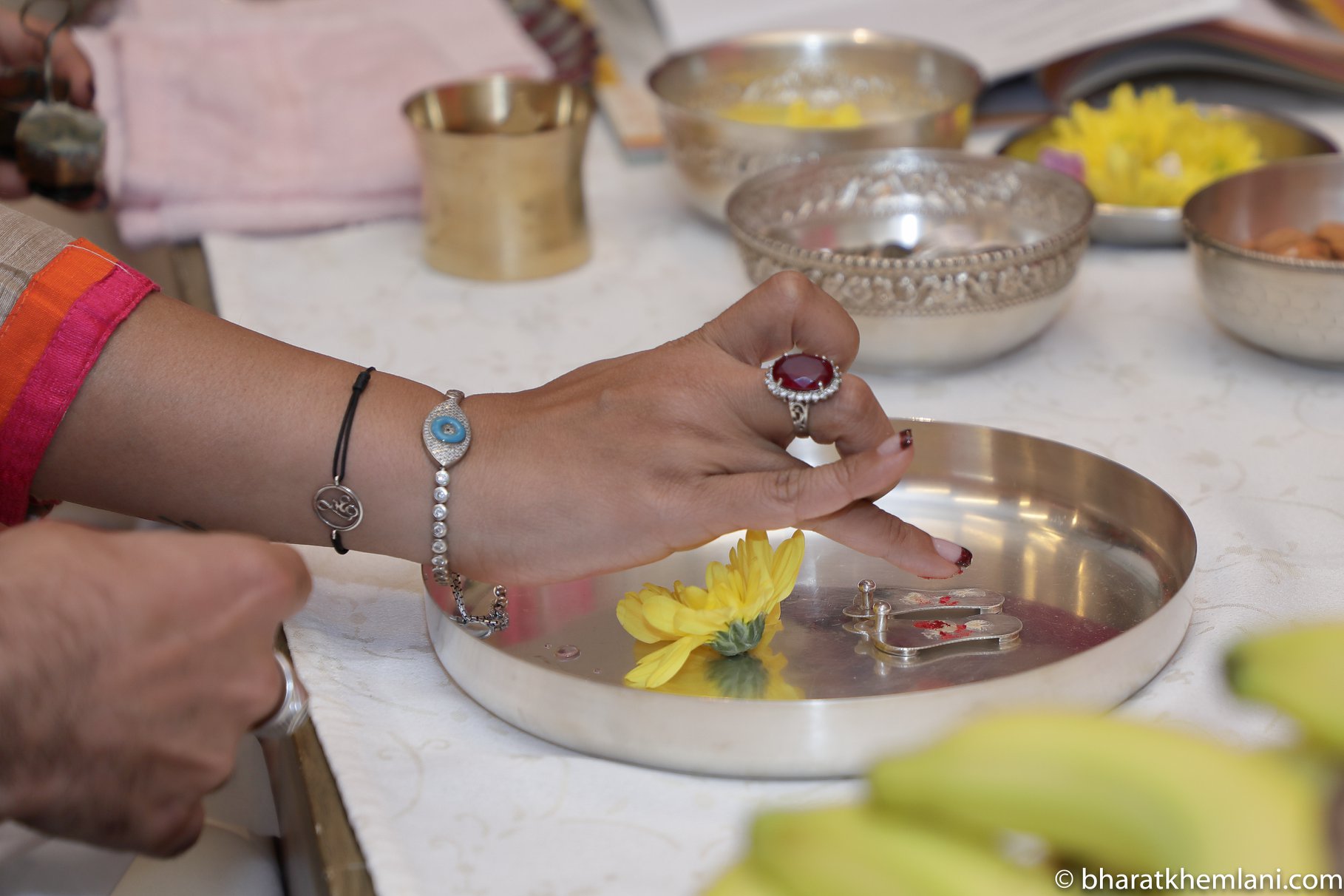
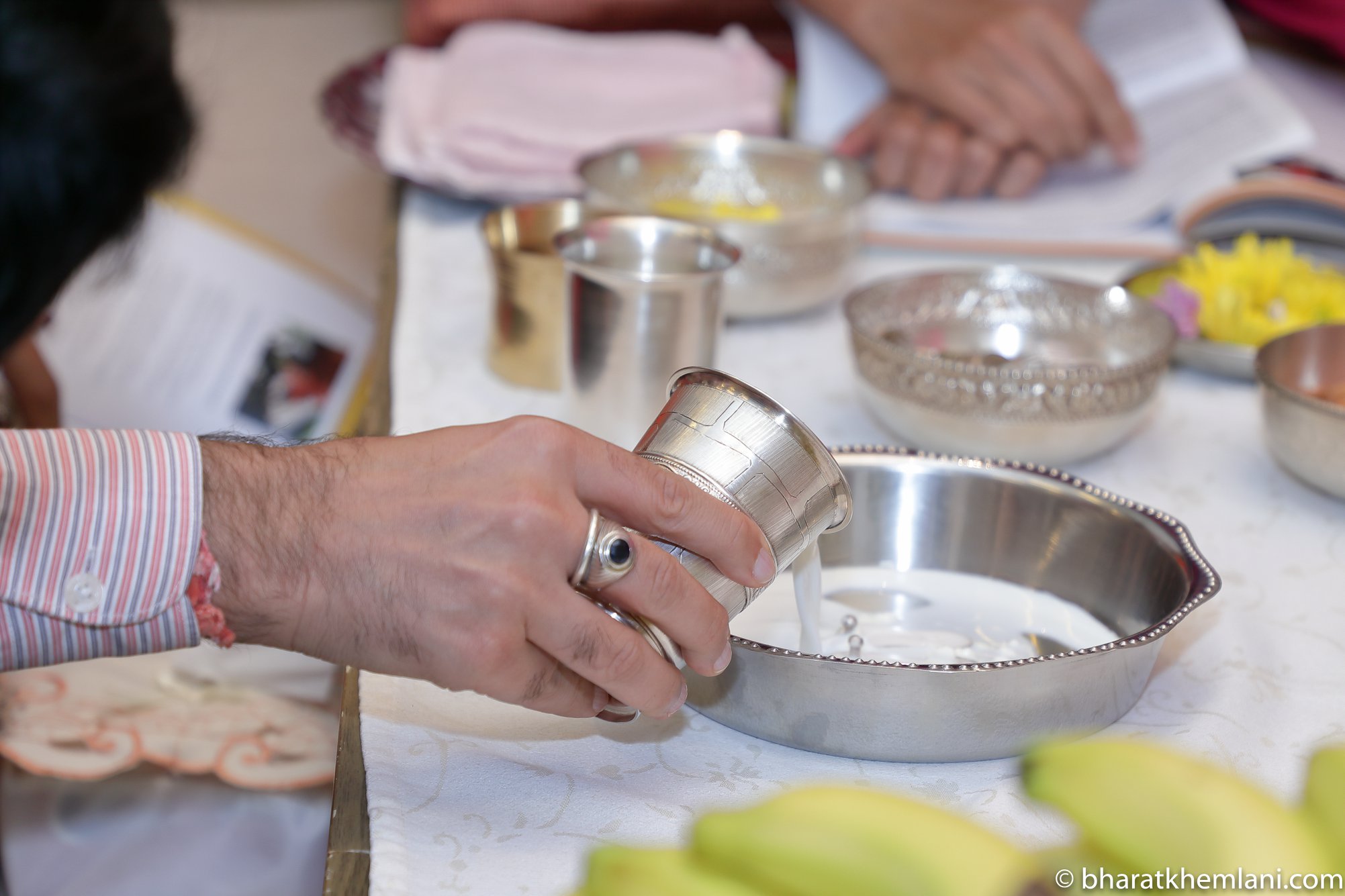
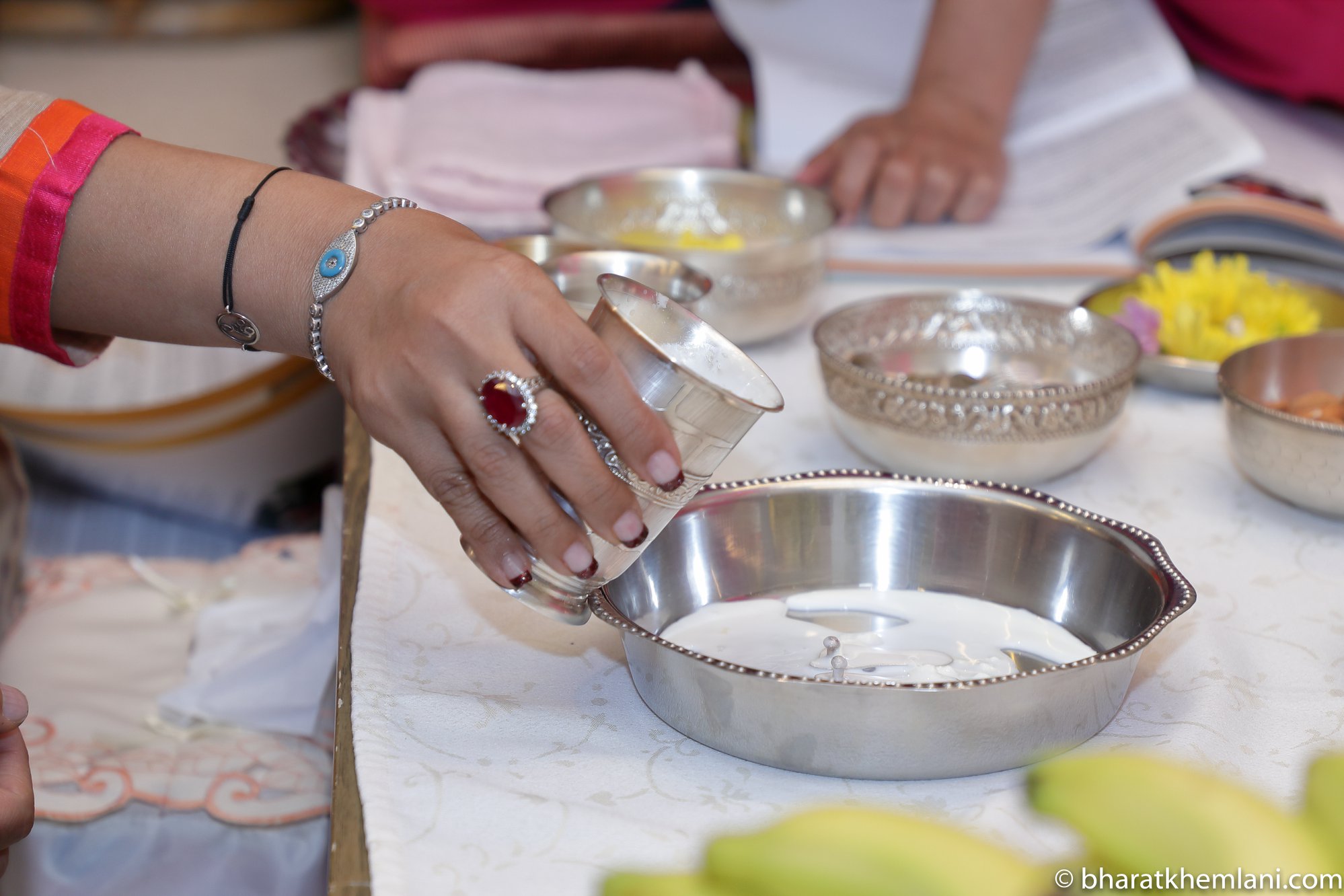

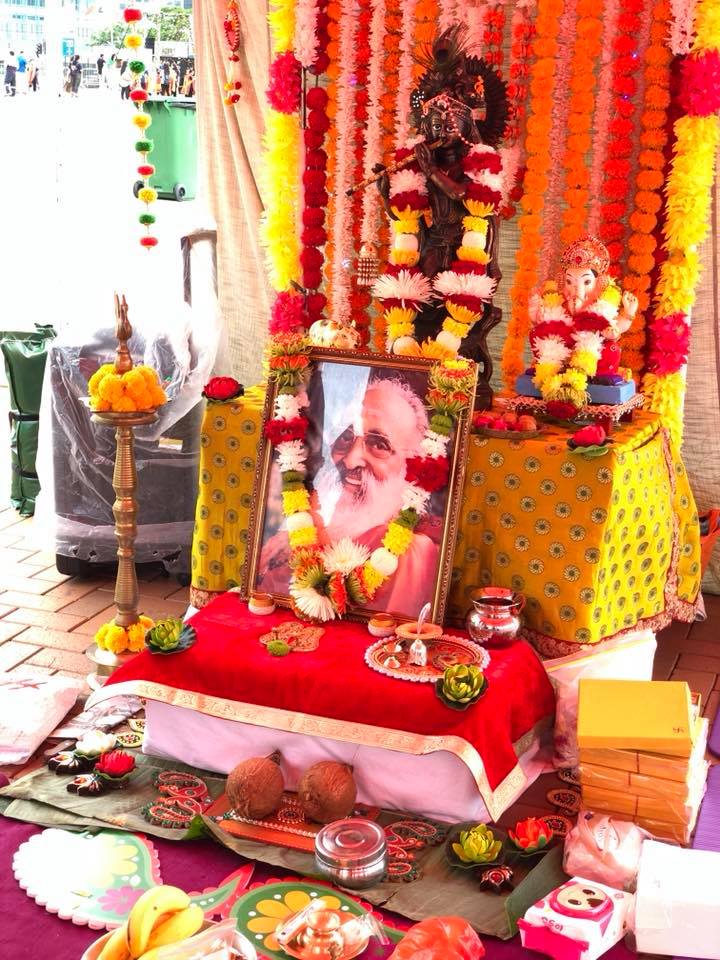
Guru Purnima - Intro for elders
"A people without knowledge of their past history , origin and culture is like a tree without roots."
This famous quote by Marcus Garvey brings out the fact that just as roots are the most important factor providing strength , growth & nourishment , balance , ability to cope with any environmental changes to the tree right , in the same way Culture is the root of a Nation and it's citizens. A tree can survive in any new land only if it is transported along with its roots . No matter where we live , we cannot afford to lose our Cultural values and ethics. And our Gurus are like the gardeners who make every effort to ensure that the roots are watered properly and manure is provided from time to time . They make sure that no harm befalls the tree or any part of the tree persay so that the tree can grow well and bear fruits and flowers . What exactly are these roots and how does the Guru take care of them ? The roots are all the various aspects of our Culture which we will be discussing in the months to come like ancient scientific traditional practices, various forms of worship , vedantic knowledge, art forms, the divine language Sanskrit , Japa , meditation , various sadhanas , tenets of Hinduism and so on .
Each one of us is an integral part of this garden where the tree of our Nation stands . We must grow from just those who admire the tree or enjoy the fruits to those who learn from the gardeners and then begin to water the tree and take care of it, also teach the same to others .
We are proud and practising Hindus , no doubt . Let us take it upon us to pass this baton of our Culture with care and commitment to the future generations so that we can to some extent repay the Rishi Runa.
Guru Purnima intro for children
Dear young and dynamic Hindus ,
Gurudev Swami Chinmayanandaji has said that "Without Culture, man is a vulture"
Why did Gurudev say this ? Yes , yes , I did hear you say "Tell me why ? Tell me why ?"
Here is the answer .
What does the Vulture do?
It seems to soar high up in the sky but it looks down for the dead carcasses on the ground . Now you may say that's it's nature . It's a scavenger .
Very true. But what we must understand is why the comparison ?
There are people who may seem to be highly successful , rich , on top position etc but if they are not cultured, then they will seek for lowly things in life. In due course , they will be unhappy and make others around them unhappy too.
So what does it mean to be cultured ?
Simple . We must understand and practise the invaluable values mentioned in our culture.
Let me give you an example .
In our Hindu culture, we say " Matru Devo Bhava
Pitru Devo Bhava , Acharya Devo Bhava and Athithi Devo Bhava " which means we must always respect and treat our mother , our father, our teachers and our guests as divine as God Himself. This is such a beautiful thought. We can also include " Rashtradevo Bhava" as our motherland Bhaarat is equally worshipful to us .
Thus our culture teaches us to see Divinity everywhere. This is also why we greet each other with a ' Namaste ' because we wish to convey that the God in me salutes the God in you .
Do you know who is a Hindu ?
H - He/ She who
I - instills &
N - nourishes
D - divinity
U - universally
Now if we understand this and we live thus then we will be cultured human beings.
We will make others happy wherever we go as rightly said by Gurudev .
Let me talk specifically about teachers today since as you all know today is Guru Purnima.
Normally how do we show respect to our teachers at school ? By standing up when the teachers enter the class, wishing them when we meet them , giving gifts on teachers day etc . Yes,these are all definitely nice ways to show respect but what's more important is to listen to the teachers , obey them , follow what they say and clarify your doubts with them . They will definitely like to see that you are interested in the subject that they are teaching you with so much love and dedication.
Do you know that each one of us is a teacher and a student at the same time .
Yes, you are a student when you learn your subjects in school , when you learn to play any musical instrument , when you learn to cook from your mother at home , and at the same time you may be a teacher to your grandfather when you teach him how to use the laptop , you may a teacher to your younger sister when you help her with her studies , you may be a teacher to your mother when you teach her how to use the latest mobile app. and so on
Don't you wish that the one learning from you must listen to what you are saying ? Don't you feel good when they thank you ? Don't you feel happy when they learn with full concentration whatever you are teaching them ?
Now , just think --
Are not your teachers expecting the same from you ? Shouldn't we make them happy and proud too ?
I did hear a big "YES" from you . Very good!!
Just like you learn something from someone and then teach it to someone else , our Gurus in Hindu Culture learnt from their Gurus and taught it to their shishyas/ students. This is called Guru parampara.
Who are these Gurus ? What have they taught ? How can we show our respect to them ?
I am sure these are some questions which may have come up in your mind .
Well, the word Guru means ' remover of darkness'
When we are in a dark room , we can't see things , don't know what is kept where and so we say to ourself " I don't know "
Only when someone enters and puts on the light , we can say " Ah! Now I know "
The Guru is the one who enters our life and puts on the light of knowledge and makes us see things clearly and correctly . We therefore must be always grateful to the Guru who removes the darkness from our life .
The ever shining and glowing Hindu culture is the greatest blessing given to us by our Gurus else we would never know about our Gods and Goddesses, our temples , our scriptures , the Ramayana, the Gita ,various forms of Pooja , Japa , festivals, Shlokas, bhajans and so many beautiful aspects of our Culture.
Imagine how dull and dark life would be without all these bright things !
We are indeed blessed and grateful to Sage Veda Vyasa, Adi Shankara, Swami Tapovan Maharaj, Gurudev Swami Chinmayananda and such great masters who have given us this Hindu Sanatana Dharma.
How do we show respect to these Gurus ?
Now, this is for all you young minds to answer !!
Share your thoughts on this topic
" I will show respect to all my Gurus by -----------"
You can mail the above to
[email protected]
Kindly also mention your name , age , address , parent's contact no. ( whatsapp no preferred)
Wishing you all a very blessed Guru Purnima
Namaste

